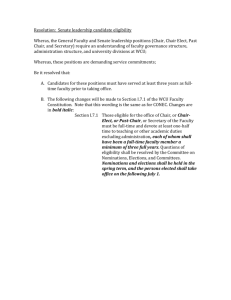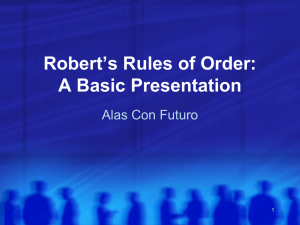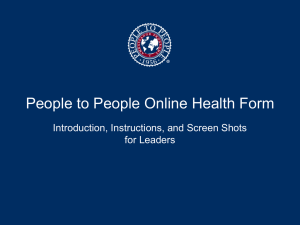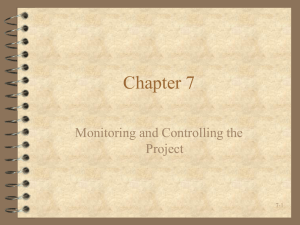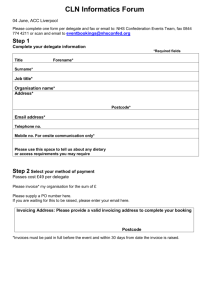Chapter Bylaws - Blogs@UMass Amherst
advertisement
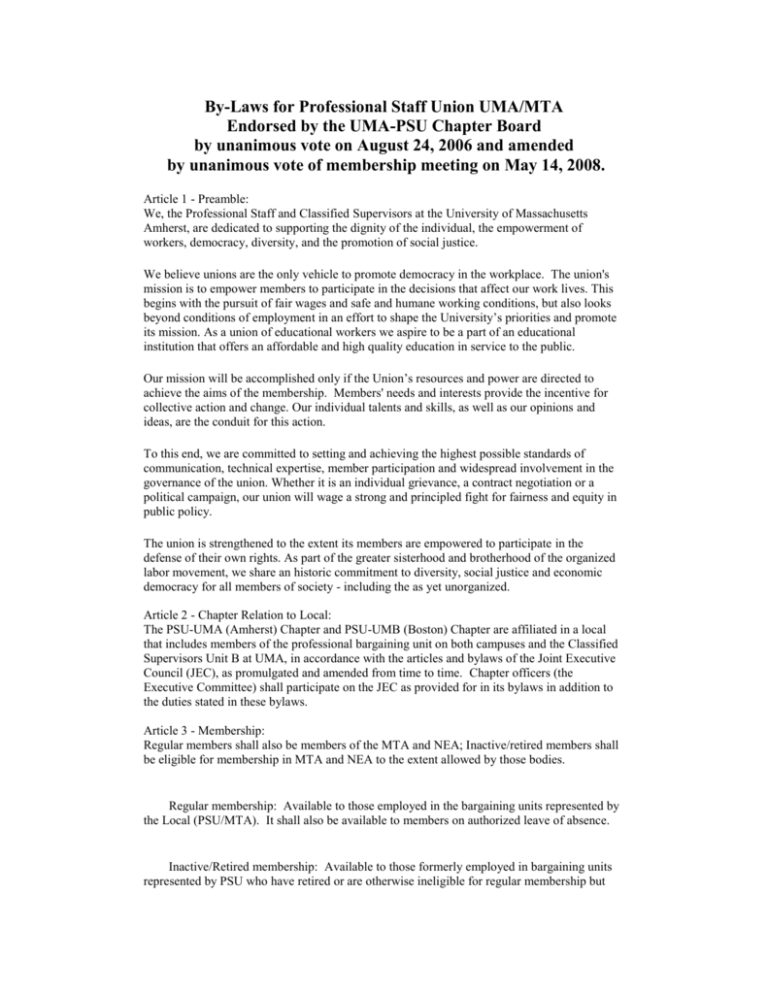
By-Laws for Professional Staff Union UMA/MTA Endorsed by the UMA-PSU Chapter Board by unanimous vote on August 24, 2006 and amended by unanimous vote of membership meeting on May 14, 2008. Article 1 - Preamble: We, the Professional Staff and Classified Supervisors at the University of Massachusetts Amherst, are dedicated to supporting the dignity of the individual, the empowerment of workers, democracy, diversity, and the promotion of social justice. We believe unions are the only vehicle to promote democracy in the workplace. The union's mission is to empower members to participate in the decisions that affect our work lives. This begins with the pursuit of fair wages and safe and humane working conditions, but also looks beyond conditions of employment in an effort to shape the University’s priorities and promote its mission. As a union of educational workers we aspire to be a part of an educational institution that offers an affordable and high quality education in service to the public. Our mission will be accomplished only if the Union’s resources and power are directed to achieve the aims of the membership. Members' needs and interests provide the incentive for collective action and change. Our individual talents and skills, as well as our opinions and ideas, are the conduit for this action. To this end, we are committed to setting and achieving the highest possible standards of communication, technical expertise, member participation and widespread involvement in the governance of the union. Whether it is an individual grievance, a contract negotiation or a political campaign, our union will wage a strong and principled fight for fairness and equity in public policy. The union is strengthened to the extent its members are empowered to participate in the defense of their own rights. As part of the greater sisterhood and brotherhood of the organized labor movement, we share an historic commitment to diversity, social justice and economic democracy for all members of society - including the as yet unorganized. Article 2 - Chapter Relation to Local: The PSU-UMA (Amherst) Chapter and PSU-UMB (Boston) Chapter are affiliated in a local that includes members of the professional bargaining unit on both campuses and the Classified Supervisors Unit B at UMA, in accordance with the articles and bylaws of the Joint Executive Council (JEC), as promulgated and amended from time to time. Chapter officers (the Executive Committee) shall participate on the JEC as provided for in its bylaws in addition to the duties stated in these bylaws. Article 3 - Membership: Regular members shall also be members of the MTA and NEA; Inactive/retired members shall be eligible for membership in MTA and NEA to the extent allowed by those bodies. Regular membership: Available to those employed in the bargaining units represented by the Local (PSU/MTA). It shall also be available to members on authorized leave of absence. Inactive/Retired membership: Available to those formerly employed in bargaining units represented by PSU who have retired or are otherwise ineligible for regular membership but who wish to maintain their affiliation with PSU. This includes those who have been laid off and retain recall rights under the Collective Bargaining Agreement, and those who have been terminated and are litigating their termination before the relevant administrative or judicial bodies. Rights: Regular members have the right to attend and participate in meetings and events, to vote on all member issues and in elections, and to run for and hold office. Inactive/retired members have all the rights of regular members except the right to vote and run for and hold office. Dues: Regular members employed in bargaining units represented by PSU shall pay dues as established by the Chapter, Local, the MTA and the NEA. New members shall arrange to pay such dues within 60 days of employment in the unit. The failure to make such arrangement or pay such dues shall result in termination. Chapter dues for employed Regular Members shall be established annually by the Executive Committee after completion of the budgetary process. Local dues for employed Regular Members shall be established annually by the JEC after completion of the budgetary process. Inactive/retired members shall pay PSU as established by the Executive Committee annually after completion of the budgetary process. Membership meetings: Powers to set general policy and revise or amend these by-laws shall rest first with members. Annual meetings shall occur between 4/15 and 5/15 each year. Notice of the date, time, and place of the meeting, with the agenda, shall be given to the members at least 7 days in advance. Special meetings may be called by the Executive Committee with the same notice requirement as the Annual Meeting. The quorum for conducting official business at a membership meeting shall be at least 50 regular members in good standing present and voting. Article 4 – Chapter Structure: The Chapter Board shall consist of the Executive Committee, and the 6 Chairs within the Delegate Council. The Executive Committee consists of the five (5) officers elected chapter-wide: 2 Co-Chairs Grievance Officer Treasurer Recording Secretary The Delegate Council Chapter Board members consist of: Delegate Council Chair Communications Committee Chair Organization/Education Committee Chair Membership Committee Chair Salary Administration Committee Chair Unit B Officer/Committee Chair Non-delegate, regular members may serve on any committee, although some committees require appointment or election per these by-laws. 4.1 a) Executive Committee: (Consists of 5 Chapter Officers, each elected unit-wide) Responsible for operational decisions, overseeing Bargaining Committees, Finance Committee, Steward Network, most committees established through Collective Bargaining Agreements, serving on the JEC, serving as Delegates to the MTA/NEA and other ad-hoc committees, such as the Contract Action Team, as needed in its judgment. Election and Terms of Officers: All Executive Officers shall be elected at large and to three-year terms. All Executive Officers shall be elected in the same year. Terms shall run from July 1 through June 30. Recall of Officers: Upon petition of 20% of the regular membership, presented to the Chapter Board, a membership meeting will be called with a minimum of twenty (20) days notice, and with a copy of the petition’s text. The officer subject to recall shall have the right to notice of grounds for recall and opportunity to defend her/himself and to question petitioners. The officer may be recalled by a two-thirds vote of those present and voting at a meeting with a quorum. Resignation of Officers: If an officer resigns, or is recalled as above, or a vacancy otherwise occurs, the Chapter Board shall appoint an interim replacement, with the approval of the Delegate Council, to serve until the next special election for that position. 4.1 b) Responsibilities of Officers: 2 Co-Chairs Duties shall be divided or shared between chairs as mutually agreed upon: Organize and attend Labor Management Committee meetings, including review of Sick Leave Bank reports Attend, and actively participate in, campus and higher education labor coalitions Seek, maintain, and participate in political coalitions, including human and civil rights issues Perform contract negotiations and monitor on-going Collective Bargaining Agreements. One chair is required to actively co-chair contract negotiations (with Boston as co-chair of bargaining committee for professional staff). Chair Chapter Board and Executive Committee meetings and oversee agenda development Treasurer Oversees that funds are managed and expended consistent with the mission and objectives of the Chapter and all applicable laws and are held in account in an appropriate financial institution. The Fiscal year shall be July1 through June 30. Chair the Finance Committee Organize and monitor budget development and adherence Record dues collections and monitor disbursement of funds in accordance with the budget per Chapter-defined policies and procedures Maintain financial records and make reports as necessary Remit funds to MTA and NEA as required Finance Committee members appointed by Chapter Board, shall develop fiscal policies and procedures, to be adopted by the Chapter Board, recommend amendments to same, support functions of Treasurer by reviewing and preparing budgets and ensuring compliance with Chapter fiscal policies and procedures. Grievance Officer Monitor the effective processing of grievances and workplace problems, monitor contract enforcement and abuses, and organize and maintain the Steward Network, including Steward training; work closely with staff to assure members’ needs are met fully and efficiently; and serve on Labor Management Committees. Recording Secretary Shall keep accurate and impartial minutes of all meetings of the Chapter Board, Executive Committee and of the general membership meetings; be responsible for the scheduling of all regular and special meetings (including room reservations); maintain official files in a secure environment. 4.1 c) Bargaining Committee: The Bargaining Committee shall be elected unit-wide. Size will be determined in consultation with PSU-UMB, and within the confines of the Collective Bargaining Agreements. Election and Terms of Bargaining Committee: Bargaining Committee members shall be elected at least nine (9) months before the termination of every collective bargaining agreement. Terms of Bargaining Committee members shall be until the successor collective bargaining agreement has been ratified and signed, unless said agreement is for a period less than 3 years. In such a case, the terms shall continue until a second successor collective bargaining agreement has been ratified and signed. Recall and Resignation of Bargaining Committee members: Bargaining Committee members shall be subject to the same provisions in Article 4.1 a) as for officers in regard to recall, resignation or vacancies. 4.2 a) Delegate Council: Shall be composed of elected representatives from each area of the University, with a goal of 1 per 20 members in each area. This body is empowered to: 1. approve the Chapter budget; o 2. 3. 4. This requires a meeting posted two (2) weeks in advance; this also requires a quorum of two-thirds (2/3rds) of the delegate body present and voting, or an absolute majority of all the delegates must be present and voting in favor elect chairs of standing committees, who shall also serve on the Chapter Board; elect unit members to the Sick Leave Bank Board; elect unit members to the Salary Administration Appeals Board; 5. elect Stewards and Chief Stewards; These elections require a meeting posted two (2) weeks in advance; these elections may be done with one half (1/2) of the delegates present and voting, or absent quorum, by electronic procedures with one half or more of all the delegates voting. This body is further charged with keeping the Chapter Board apprised of the will of the members, and communicating to each Delegate’s area of representation information from the Chapter Board. The Delegates shall also be responsible for fostering Union communication to their members, for keeping their members informed, for relaying the concerns of their members to the Delegate Council, for assisting new members, for referring their members to the appropriate union officers or staff in case of questions, and for otherwise acting as liaison between their members and the Delegate Council. This body shall meet at least 6 times per year. Election and Terms of Delegates: Terms of Delegates will be for 2 years, but the first constituted group will have half its members elected for 1 year so that future elections will be staggered, and half of the body may turn over every year. Terms shall run from July 1 through June 30. Delegate elections will be done individually in each University executive area, with the period of notice being 7-14 days and the election in 1 week. The Delegate Council election shall be held by mid-June. Resignation of Delegates: If a Delegate resigns, or a vacancy otherwise occurs, the Delegates in the affected area shall agree on and the Delegate Chair shall appoint a replacement to serve until the next election for that position. Candidates should, but it is not mandatory, work in their area of representation. 4.2 b) Delegate Council and Committee Chairs: The Council is led by the Delegate Chair, elected by Delegates from among the Delegates, who also sits on the Chapter Board. The Council shall also elects from itself five (5) Chairs for the following Standing Committees, each to also sit on the Chapter Board. Communication Committee Chair Responsible for all internal and external Chapter communications, including minutes, web page, email, E-news letter, and correspondence. Organizing/Education Committee Chair Responsible for internal organizing and educating members about the Union. Membership Committee Chair Responsible for welcoming/orienting new employees/members, maintaining data lists for MTA and the Local. Salary Administration Program Committee Chair Monitors SAP and members’ reviews, establishes SAP Steward Network Unit B Officer/Committee Chair Responsible for Unit B development and organization (allows for their own structure). Election and Terms of Delegate Chair and Committee Chairs: Terms of the standing committee chairs, and Delegate Chair, will coincide with their Delegate terms, but with an option for reappointment and shall run from October 1 through September 30. The election of the Delegate Council chair and standing committee chairs shall be held in September. Recall and Resignation of Delegate Chair and Committee Chairs: If the Delegate Chair or a committee chair resigns, is recalled by a vote of the Delegate Council following a similar procedure to that in Article 4.1 a), or a vacancy otherwise occurs, the Delegate Council, in consultation with Chapter Officers and/or members of the affected committee, shall agree on and appoint a replacement to serve until the next special election for that position. The Council shall recruit members for the above standing committees from the entire Chapter membership. The minimum size for each Standing Committee shall be 3 members, including the chair. The optimal size and structure shall be further determined by each committee for its own best purpose and function, and may change according to current Chapter needs. 4.3 a) Chapter Board: Shall have executive powers of the Chapter which includes preparing the annual budget for the Chapter and recommending the budget to Delegate Council; establishing dues; authorizing payments in accordance with Chapter, Local, and MTA/NEA Policies and Procedures; approving Chapter policies and procedures; implementing decisions of Membership; establishing a Nominations and Elections Committee; appointing and approving officers, chairs and members of committees in accordance with these bylaws; making special rules as needed to govern the affairs of the chapter; and calling special meetings of the Membership. All Chapter Board members shall be subject to recall, like officers, and replacement upon resignation or recall. Subject to Article 4.2 b), the Chapter Board shall have the power to remove by twothirds vote, a CB member elected to a specific position on recommendation of the CoChairs if s/he fails to perform the duties of the position to which s/he was elected. Shall meet at least once per month and at least twice over the summer months (JuneAugust), and as called by a Co-Chair. Quorum: one-half of current CB members. 4.3 b) Nominations and Elections Committee: A Nominations and Elections Committee shall be a standing committee of the chapter. It shall consist of at least 3 members of the chapter appointed by the Chapter Board. Terms of the Chair of the Nominations and Elections Committee shall be two years with option for reappointment. Terms shall run from July 1 through June 30. No member of the Chapter Board shall be eligible to serve on the Nominations and Elections Committee. Nominations and Elections Committee Responsibilities: The Nominations and Elections Committee shall be responsible for soliciting nominations for all elective chapter offices unless otherwise specified herein. This committee shall verify eligibility and then present the candidates for a vote by members of the Chapter. The Nominations and Elections Committee shall also be responsible for conducting collective bargaining agreement ratification votes by secret ballot at places and times accessible to unit members. Absentee ratification ballots shall be made available to regular unit members upon advance written request. The Nominations & Elections Committee shall inform all active Chapter members of the opportunity to serve as a delegate to the MTA’s and the NEA’s annual meetings in a timely manner in accordance with MTA and NEA election timelines and procedures. The Nominations & Elections Committee shall establish election policies and procedures, including electronic secret ballot procedures, election waiver policies, special elections, etc., as needed. This Committee shall work closely with the Membership Committee and the Communications Committee to facilitate the election process. All policies and procedures established by the Nominations & Elections Committee must be approved by the Chapter Board. Article 5 –Elections: In chapter-wide elections of Executive Officers, a list of nominees shall be presented at the annual membership meeting, and nominations will be sought from the floor. Chapter-wide elections shall be conducted by secret ballot by mid-June, at places and times accessible to unit members. Absentee ballots shall be made available to regular unit members upon advance written request. In accordance with the MTA and NEA annual meeting delegate election waiver policy, in the event the number of candidates is equal to (or less than) the number of delegate seats available to the Chapter, an election need not be held. Article 6 - Standing Rules and Orders: Meetings shall be conducted by standing rules to be determined, with exceptions by Robert’s Rules. The Executive Committee and Membership shall have the power to adopt, amend, and repeal any standing rules and orders, consistent with the provisions of these Bylaws. Article 7 - Adoption and Amendments: These By-laws shall be adopted by two-thirds (2/3rds) of the members voting in secret ballot, after notice as specified herein and a public meeting/hearing for questions and comments from membership. Amendments may only be made by the Membership at a duly called meeting with notice of proposed amendment, with quorum, and upon a two-thirds (2/3rds) vote of those present. Hot Topics: PHENOM FLSA (overtime eligibility) Labor-Management Workplace Education Program SERV: State Employees Responding as Volunteers Program PSU Structure: Joint Executive Council Executive Committee Chapter Board Delegate Council Negotiating Committee Membership Communication Organization & Education Elections Committee Salary Administration Sick Leave Bank Committee
